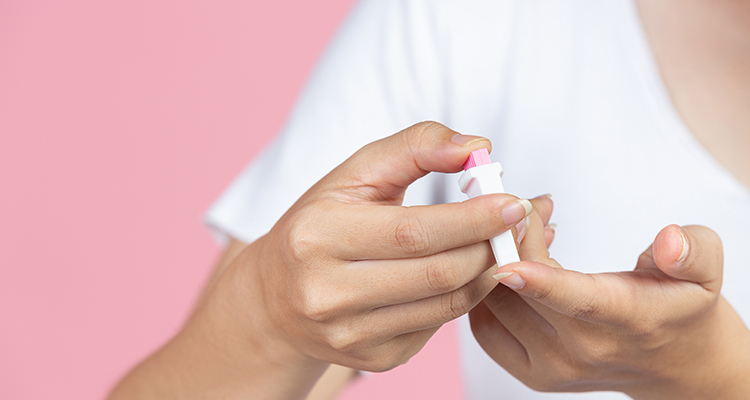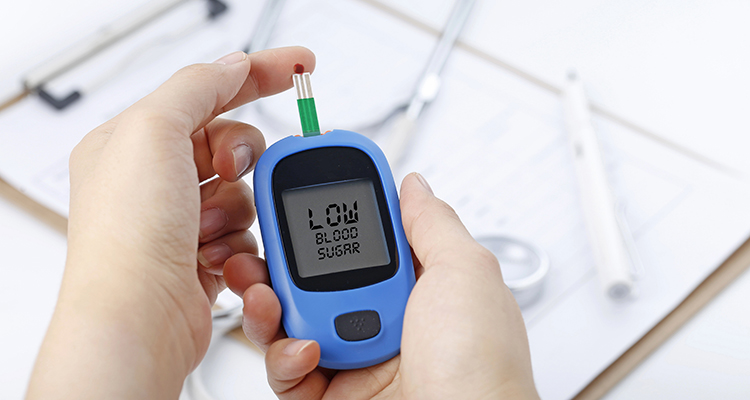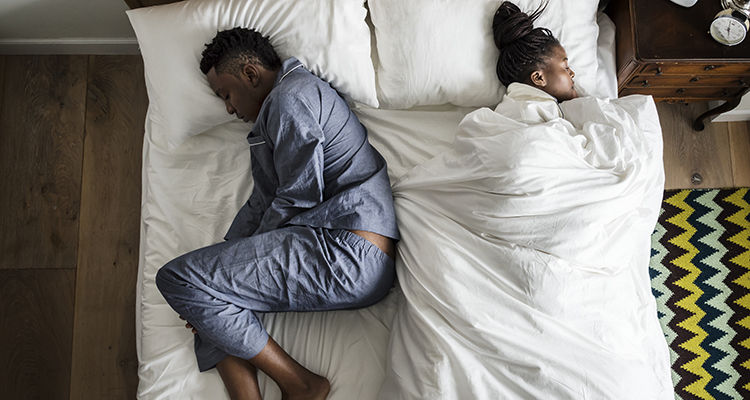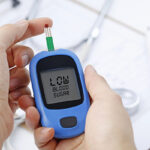The Connection Between Diabetes and Sleep
Countless things can disturb your sleep from lifestyle choices and travel to illness and other underlying issues. One such condition that most people don’t consider is diabetes. Just over 1 in 10 people are diagnosed with either type 1 or type 2 diabetes. Symptoms and side effects range from increased thirst and urination to changes in weight, increased hunger, blurred vision, and tingling in your hands and feet. While some diabetes patients experience increased fatigue, others have the opposite problem, finding it difficult to fall and stay asleep.

Are you wondering how a diabetes diagnosis will affect your sleep quality? Or if your insomnia symptoms are an unpleasant side effect of a recent diabetes diagnosis?
In this article, we’ll discuss what diabetes is, including causes and symptoms, how it impacts sleep, and what you can do about it.
Content
What is Diabetes?
Diabetes is a chronic medical condition that impacts how your body metabolizes food and turns that food into energy. The food you eat is broken down and turned into sugar (glucose) and then released into your bloodstream. As your blood sugar rises, your pancreas starts producing and releasing insulin. Insulin then creates pathways through which blood sugar enters your cells where it’s then stored and used as energy.

If you suffer from diabetes, your body doesn’t produce enough insulin or doesn’t use it properly. Without adequate insulin levels, too much glucose remains in your bloodstream creating serious health problems like vision loss, kidney disease, and heart disease. All of these symptoms are precursors for diabetes. There are two common types of diabetes — type 1 and type 2.
Type 1 Diabetes
Type 1 diabetes is far less common than type 2 and is triggered by an autoimmune reaction where your body stops producing insulin. Only about 10% of people have this form of diabetes, with most symptoms surfacing in children and young adults. Type 1 diabetes patients require daily insulin — some, for the rest of their lives.
Type 2 Diabetes
Type 2 diabetes is much more common, making up nearly 95% of all diabetes cases. This condition occurs when your body doesn’t process and utilize insulin properly, resulting in higher than normal blood sugar levels. Symptoms of type 2 diabetes generally take years to develop, which is why most cases are diagnosed in adulthood. Symptoms of type 2 diabetes are also milder than type 1 and may go unnoticed. Getting routine blood work that involves a blood sugar test can help detect this condition and alert you if you’re a prediabetic. The good news is, certain lifestyle and diet changes can help prevent or delay type 2 diabetes from developing.
The third form of diabetes, known as gestational diabetes, occurs only in pregnant women.
The Connection Between Sleep and Diabetes
The relationship between sleep and diabetes is a complicated one. Insomnia is a common side effect of diabetes and a lack of sleep may increase your risk of developing diabetes, creating a vicious cycle.

Because type 2 diabetes is the most common, it’s often these patients that report significant sleep troubles. In fact, 50% of type 2 diabetes patients suffer from some form of insomnia. This is usually due to unstable glucose levels and other related symptoms. Fluctuating blood sugar levels throughout the night can also trigger insomnia at night and cause daytime fatigue.
Some diabetes patients report feeling depressed, stressed, or anxious — all of which are psychological conditions that can interrupt your sleep. Many diabetics also struggle with their weight, putting them at a higher risk of developing sleep disorders including sleep apnea. (More on this later). A poor diet can also create gastrointestinal issues like acid reflux and nausea, making it difficult to fall and stay asleep. Overweight individuals are also at greater risk of experiencing chronic pain — another leading cause of insomnia.
The Role of Blood Sugar Levels
One way your body works to reduce high blood sugar levels is through urination. If your blood sugar levels are too high, your kidneys will compensate and you’ll experience an increased urge to urinate, especially at night. High blood sugar levels also cause increased thirst, daytime fatigue, and headaches which may make it difficult to get a quality night’s sleep.
Low blood sugar levels may interrupt your sleep by causing night sweats, nightmares, and feelings of confusion and irritability. Feeling anxious or aggravated at night due to a dip in your blood sugar makes it difficult to relax enough to fall asleep. The inability to sleep or worry over frequent awakenings can only make matters work, increasing your anxiety and making it increasingly harder to fall and stay asleep.
Stabilizing your blood sugar levels is essential for not only managing your diabetes but also improving sleep quality.
Lack of sleep can also negatively affect your blood sugar levels, worsening symptoms in some diabetes patients. Less restorative-wave sleep may cause higher than normal blood sugar levels in both diabetics and those who are prediabetic. Research suggests that sleep restriction negatively affects not only insulin levels but also cortisol and oxidative stress levels.
Approximately 25% of those with diabetes get less than the recommended 7 to 9 hours of sleep each night, putting them at greater risk for elevated glucose levels. Lack of sleep and irregular sleep schedules may also cause insulin resistance. Inconsistent sleep schedules in some people go hand-in-hand with poor diet and unhealthy lifestyle choices that cause weight gain and obesity. This is one reason following a consistent sleep schedule is important for maintaining healthy blood sugar levels and easing insomnia symptoms.
Speaking of maintaining a healthy weight, another side effect of both diabetes and sleep deprivation is increased hunger. A decrease in leptin, which is the hormone that signals your body that it’s full, causes many diabetics to overeat. After a poor night of sleep, some people ingest larger quantities of both caffeine and foods high in sugar to try and boost energy and blood sugar levels. These foods can not only interfere with your sleep but increase your risk of developing both obesity and diabetes. Lack of energy caused by inadequate sleep and low blood sugar levels makes it difficult for some people to get the recommended amount of daily physical activity creating another risk factor for unhealthy weight gain.
Your physical health isn’t the only thing impacted by type 2 diabetes or fluctuating blood sugar levels. Poor sleep quality can have long-term effects on your psychological and mental health. These symptoms are worse in diabetics who also take sleep medications. Some evidence suggests these individuals are at greater risk of experiencing psychological distress and experiencing cognitive decline in the future.
Common Sleep Disorders in Diabetic Patients
In addition to insomnia, individuals with diabetes are at higher risk for certain types of sleep disorders. Research is ongoing but some studies suggest that certain diabetes symptoms may trigger these sleep disorders.

Obstructive Sleep Apnea
Obstructive Sleep Apnea (OSA) is a sleep disorder characterized by momentary lapses in breathing while you sleep. People with OSA stop breathing for several seconds at a time throughout the night. These episodes, known as micro-arousals, occur in different levels of severity, interrupting your sleep, increasing your heart rate, and lowering oxygen levels. OSA can cause insulin resistance and lessen your body’s ability to metabolize glucose properly. Frequent awakenings prevent you from naturally progressing through the 4 sleep stages you need to wake to feel rested and energized. Instead, many OSA patients report feeling disorientated, drowsy, and lethargic. Common signs of Obstructive Sleep Apnea include snoring, gasping for air, and daytime fatigue.
In most cases, the patient isn’t aware of these symptoms. It often takes a spouse, roommate, or another person to point it out. Obstructive Sleep Apnea is more common in obese and overweight people or those with a larger neck circumference. Large muscles and extra tissue in the neck and throat obstruct the airway, making it difficult to breathe. These muscles relax even more at night and after consuming alcohol, triggering OSA episodes. OSA is generally treated using a CPAP — continuous positive airway pressure — machine that uses forced air to keep the airways open. It also helps to restore normal breathing patterns. In severe cases, surgery may be required.
Because diabetics tend to be overweight or struggle with obesity, they’re also at greater risk of developing this dangerous sleep disorder.
Sleep Apnea and Diabetes
Increased risk of developing Obstructive Sleep Apnea isn’t the only connection that exists between this sleep disorder and diabetes. While sleep apnea can’t directly cause diabetes, it has been reported to increase insulin resistance significantly. 1 in 4 people with type 2 diabetes also has OSA. Countless other type 2 diabetics also suffer from other sleep-related breathing disorders.
Treating sleep apnea using a CPAP machine may improve blood sugar levels and insulin resistance, short-term.
Restless Legs Syndrome (RLS)
Restless legs syndrome (RLS) affects about 10% of the population, with women being at greater risk than men. When it comes to RLS and diabetes, 1 in 5 people with type 2 diabetes also suffer from restless legs syndrome. The most common side effects include tingling or numbness in the legs and feet and an uncontrollable need to move your legs to relieve discomfort. These symptoms are worse at night or when your body is at rest, which is why RLS often causes insomnia.
In addition to RLS, type 2 diabetics are at increased risk of developing a similar condition known as peripheral neuropathy. While symptoms are generally the same, peripheral neuropathy is caused by nerve damage and may cause long-term complications.
How to Ease Insomnia and Diabetes Symptoms Together
Sleep troubles and diabetes often go hand-in-hand. Individuals with diabetes experience a variety of insomnia symptoms for various reasons and lack of sleep can increase your risk of developing diabetes. This is why adopting a healthy lifestyle is key for easing both insomnia and diabetes symptoms.

Here are a few of the best ways to accomplish both.
Eat the Right Foods
Controlling your blood sugar levels is step one in effectively treating and preventing type 2 diabetes. Your diet should consist of plenty of healthy fats including nuts, avocados, and fatty fish. Eggs, beans, leafy greens, and plain Greek yogurt are also great choices for maintaining a healthy weight and stabilizing blood sugar levels. Avoid any food containing artificial sweeteners and flavors, carbohydrates made using white flour, flavored coffee drinks, and trans fats. These will cause a dangerous surge in your blood sugar levels.
A balanced diet promotes healthy weight, prevents obesity, and supports good sleep quality. Eating a heavy or fattening meal before bed can cause gastrointestinal issues that keep you up at night. It also makes you more alert as your body works to breakdown the food you just ate. Research also shows that eating too close to bedtime can lead to unwanted weight gain.
Get Active
A healthy diet and consistent exercise regimen go hand-in-hand when treating diabetes, maintaining a healthy weight, and getting quality sleep. Physical activity helps diabetics manage their condition by making their body’s more sensitive to insulin. It also balances blood sugar levels and reduces the risk of future nerve damage and heart disease. Getting plenty of exercise is also key in maintaining a healthy weight and reducing the risk of obesity.
When you exercise in the morning, you’ll feel more tired at night and more prepared to fall asleep faster. Avoid working out too close to bedtime as this may increase energy levels and leave you feeling too alert to fall asleep.
Establish a Consistent Sleep Schedule
As previously mentioned, establishing a consistent sleep schedule is an important part of leading a full, healthy life and reducing the impact of diabetic symptoms. That’s because an inconsistent sleep schedule can lead to insulin resistance. In addition, those who have erratic sleep patterns are more susceptible to both weight gain and psychological issues including anxiety and stress.
Try going to bed and waking at the same time each day. Avoid arousing activities too close to bedtime including the use of electronic devices. The blue light from computer, phone, and television screens prevents your brain from releasing the sleep hormone melatonin. Instead, try meditating, taking a soothing bath, or reading from a book. Set your alarm for the same time each morning, even on weekends. Before long, you may find yourself naturally getting tired around the same time each night and waking up before your alarm. This consistency can help regulate your insulin levels and promote a healthy weight and mind frame.
Upgrade Your Bedroom Environment
Your bedroom environment and atmosphere play a big role in your sleep quality. Create a space that’s welcoming, relaxing, and conducive to sleep. Eliminate distractions by using a sound machine to reduce outside noises and room darkening shades or an eye mask to block out unwanted light.
Avoid doing anything in bed except for sleeping or having sex. Working, eating, or watching television in bed confuses your mind and body into thinking it’s okay to be awake and alert in bed. You want your bedroom to signal rest and relaxation. Keep your bedroom at a comfortable temperature as well to prevent night sweats. The optimal temperature for sleep is 65 degrees Fahrenheit or 18.3 degrees Celsius.
Take Control of Your Health
Nearly 35 million people will deal with diabetes in their lifetime. A mix of lifestyle changes and medication can help ease symptoms and support a full, healthy life. Insomnia is a common side effect of diabetes and lack of sleep can worsen symptoms. By treating your sleep troubles and diabetes together, you can ease symptoms, regulate blood sugar levels, and reduce your risk of developing other medical conditions.

Somnus Therapy uses a multifaceted approach to insomnia treatment. By understanding and accepting your condition you can start down the path of recovery and start living your best life!













